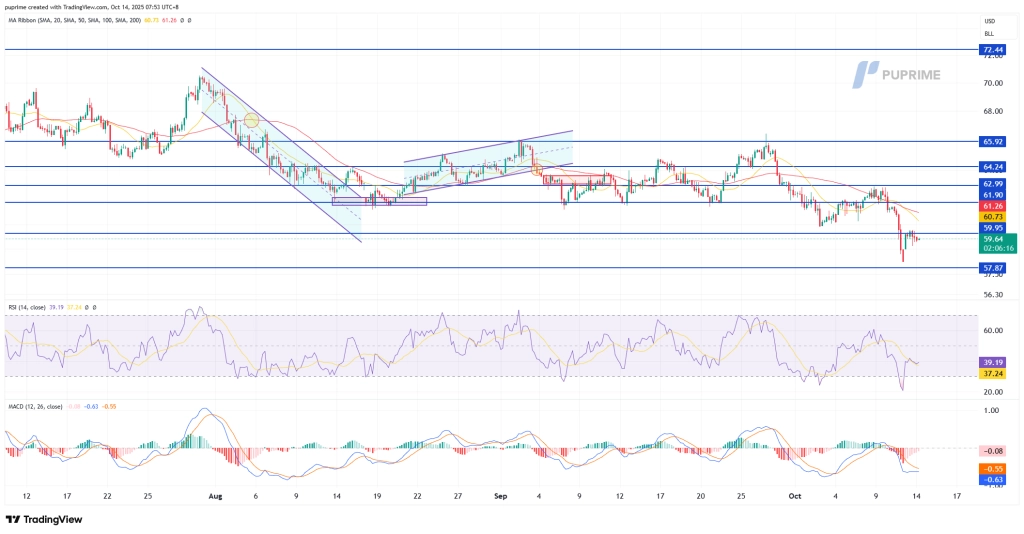-
- Trading Platforms
- PU Prime App
- MetaTrader 5
- MetaTrader 4
- PU Copy Trading
- Web Trader
- PU Social
-
- Trading Conditions
- Account Types
- Spreads, Costs & Swaps
- Deposits & Withdrawals
- Fee & Charges
- Trading Hours


*Modest Rebound: Crude prices recovered after last week’s selloff, buoyed by easing U.S.–China trade tensions and improved global risk sentiment.
*Macro Headwinds Persist: Weak global growth indicators and the ongoing U.S. government shutdown continue to limit upside potential for demand recovery.
*Geopolitical Risk Returns: Reports of expanded U.S. military aid to Ukraine have reintroduced a moderate risk premium, keeping supply concerns in focus.
Market Summary:
Crude oil prices staged a cautious recovery, reclaiming the $59–$60 per barrel range after last week’s sharp selloff. The rebound was largely technical, supported by a softer tone in U.S.–China rhetoric and an improvement in overall risk appetite across global markets. President Trump’s conciliatory remarks helped ease fears of an immediate escalation in trade tensions, providing short-term relief to energy demand sentiment. However, the broader outlook for oil remains defined by a delicate tug-of-war between macroeconomic headwinds and persistent supply-side risks.
While easing trade tensions have provided breathing space for demand expectations, lingering concerns about global growth continue to limit upside momentum. Sluggish industrial activity in major economies, coupled with the prolonged U.S. government shutdown, has kept traders cautious about the pace of energy consumption recovery. On the geopolitical front, reports that Washington may expand military support to Ukraine—including the potential supply of long-range missiles—have reintroduced a modest risk premium into the market. Still, OPEC+’s disciplined production management and cautious rebalancing efforts remain key stabilizing forces, preventing deeper declines in prices.
In the near term, oil is expected to trade within a tight range, guided primarily by shifts in risk sentiment and macroeconomic data. A durable trade détente could reignite optimism over global demand and lift prices, while renewed geopolitical flare-ups or weaker growth indicators would likely trigger another bout of volatility. Overall, crude remains in a fragile equilibrium—caught between fading trade anxiety, geopolitical uncertainty, and a slow-moving demand recovery.


USOIL, H4:
WTI crude continues to exhibit a clear downtrend, with price action forming successive lower highs and lower lows since late September. The latest breakdown below $59.95 support confirmed bearish control, briefly touching $57.90, a level not seen since late June. Despite a mild rebound attempt, the recovery has so far been capped by the 20-period moving average near $60.70, keeping the broader bias negative.
Momentum indicators remain subdued that the RSI is holding near 39, reflecting weak buying pressure, while the MACD stays below the signal line, signaling that bearish momentum still dominates. Unless the price reclaims $61.90–$63.00 resistance, any rebound is likely corrective rather than a trend reversal.
In the near term, oil may consolidate between $57.90 and $59.95, with a decisive close below $57.87 potentially paving the way toward $55.50. Conversely, a sustained recovery above $63.00 could neutralize the bearish tone and signal the start of a broader retracement toward $65.90.
Resistance level: 59.95, 61.90
Support level: 57.90, 56.90


Trade forex, indices, metal, and more at industry-low spreads and lightning-fast execution.
Sign up for a PU Prime Live Account with our hassle-free process.
Effortlessly fund your account with a wide range of channels and accepted currencies.
Access hundreds of instruments under market-leading trading conditions.